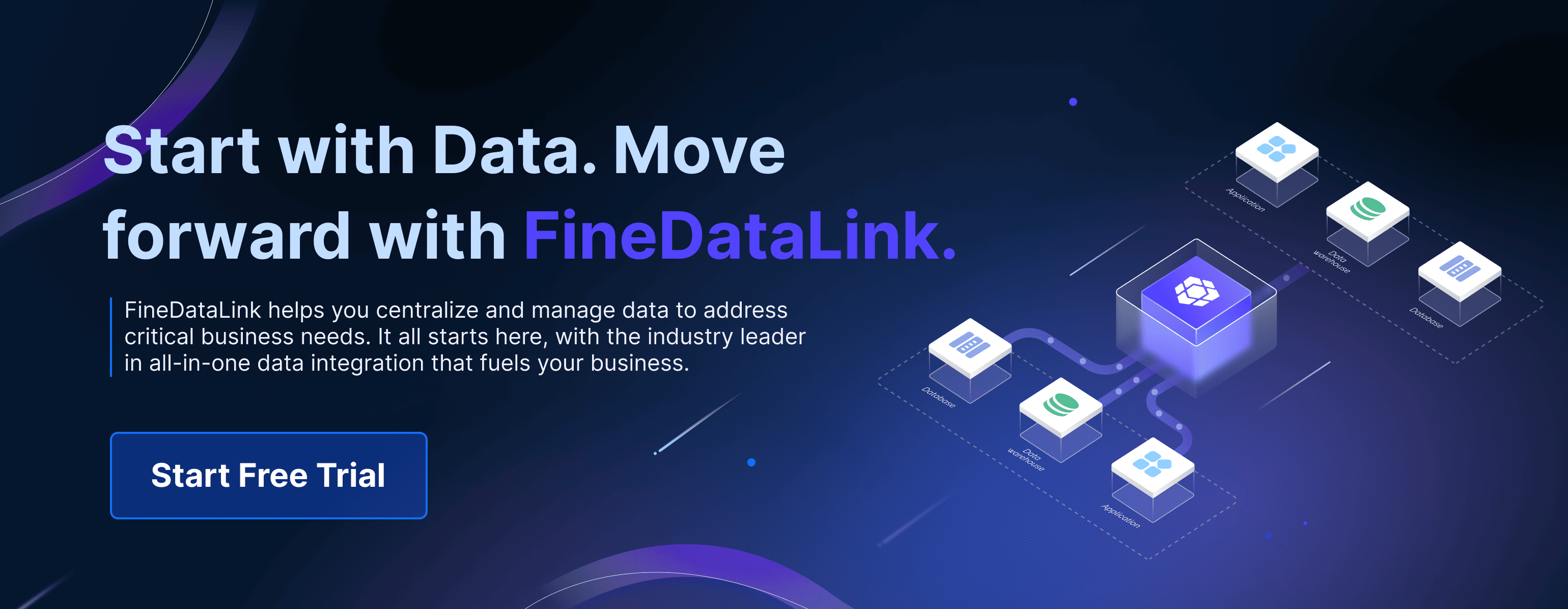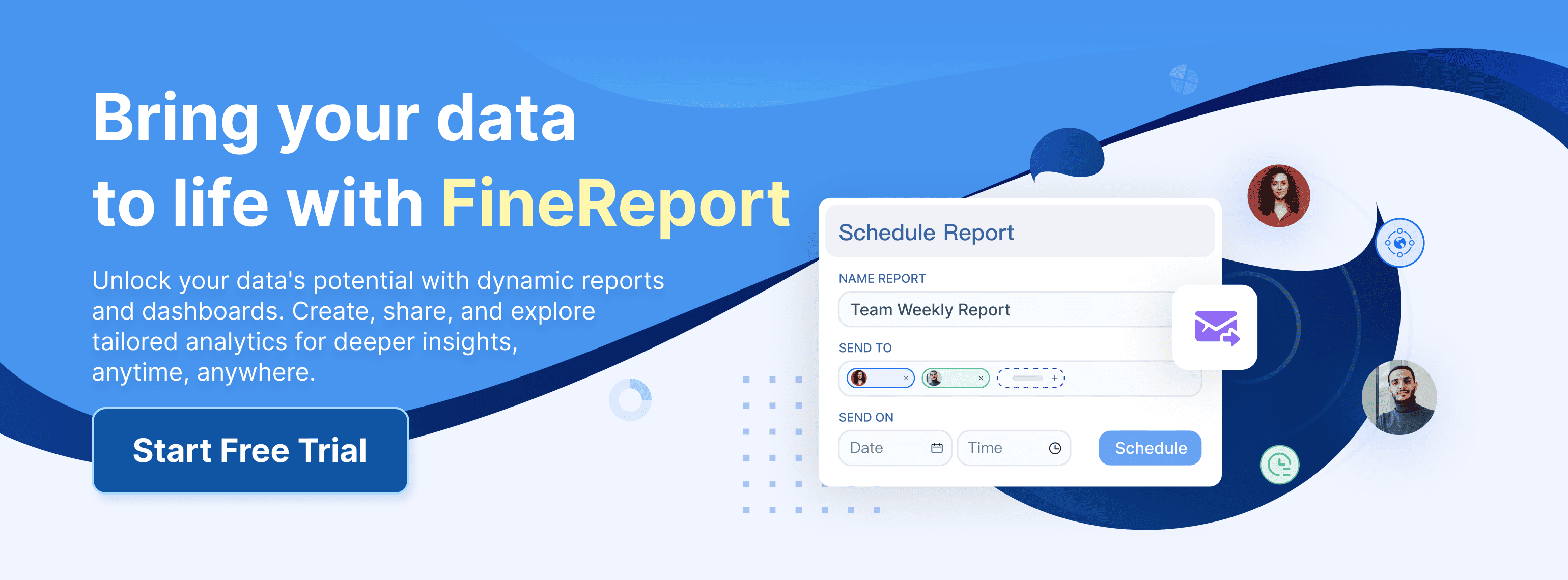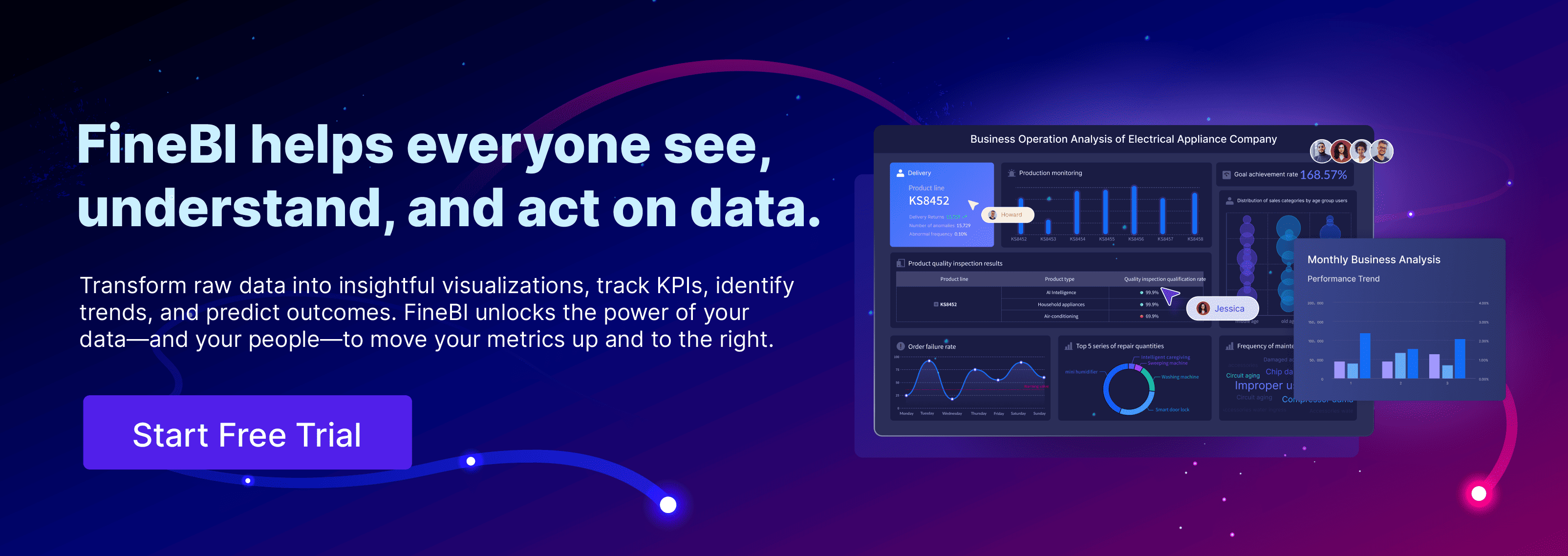

Data connectors serve as essential tools for integrating and transferring data between systems. They automate data transfer processes, saving time and effort. By connecting disparate systems, data connectors enable businesses to access real-time data, resulting in more informed decisions and heightened productivity. They streamline operations by centralizing data, improving data quality, and breaking down data silos. This integration promotes collaboration within organizations and enhances business intelligence. Tools like FineDataLink, FineReport, and FineBI exemplify how data connectors can transform data handling, making them invaluable for modern businesses.
The Importance of a Data Connector for Businesses
Improved Decision-Making
Data connectors play a pivotal role in enhancing decision-making processes within organizations. By integrating data from multiple sources, they provide a comprehensive view of business operations. This integration allows businesses to access, combine, and analyze data efficiently, leading to well-informed decisions. Various experts in data integration emphasize that data connectors enable organizations to merge data from disparate systems, improving data accuracy and consistency. This capability proves indispensable for businesses aiming to streamline operations and unearth valuable insights.
"Data connectors enable organizations to access, combine, and analyze data sources for improved decision-making," say experts in the field.
By breaking down data silos, data connectors foster a data-driven culture, empowering teams to work collaboratively towards shared goals.
Increased Productivity
Data connectors significantly boost productivity by automating data transfer processes. They eliminate the need for manual data entry, saving time and reducing errors. Experts highlight that data connectors automate the data transfer between systems, allowing employees to focus on more strategic tasks. This automation streamlines data integration, enabling businesses to derive insights efficiently across multiple platforms.
"Besides improving the decision-making process, a data connector helps increase efficiency in many ways," note experts.
By providing easy access to necessary data, data connectors enhance organizational agility and facilitate faster results.
Enhanced Data Security
In today's data-driven world, ensuring data security is paramount. Data connectors contribute to enhanced data security by providing a standardized interface for data transfer. They ensure that only authorized members of an organization can access sensitive information. Experts assert that data connectors improve data security by enabling seamless data integration and synchronization.
"The benefits of data connectors extend across the entire company, allowing better business intelligence decisions, improved security, and a robust and seamless flow of information," experts explain.
By automating data processes, data connectors help identify and address data quality issues, ensuring that only clean and reliable data is used. This capability not only protects sensitive information but also enhances overall data integrity.
How the Data Connector Works
Data connectors serve as vital components in the seamless integration and synchronization of data across various systems. They automate the process of data transfer, ensuring that information flows smoothly between different applications and databases. This section delves into the mechanics of how data connectors operate, highlighting their role in connecting data sources, extracting data, and transforming it for optimal use.
Connecting Data Sources
Data connectors establish a bridge between disparate data sources, enabling them to communicate effectively. They provide a standardized interface for data transfer, allowing different systems to exchange information regardless of the programming language or database technology used. By connecting data sources, data connectors facilitate the seamless flow of information, ensuring that data remains consistent, current, and accessible for analysis.
- Standardized Interface: Data connectors offer a uniform platform for data exchange, bridging the gap between different systems.
- Seamless Communication: They enable disparate systems to 'talk' to each other, ensuring smooth data transfer.
- Centralized Access: By connecting various data sources, data connectors provide a centralized repository for data, promoting collaboration within organizations.
Extracting Data
Once data sources are connected, data connectors extract data from these sources. This process involves reading data from a source system and preparing it for transfer to a destination system. Data connectors automate this extraction process, eliminating the need for manual data entry and reducing the risk of human error. This automation not only saves time but also ensures that data is readily available for analysis and utilization by business teams.
- Automated Extraction: Data connectors automate the data extraction process, minimizing manual effort and errors.
- Efficient Data Handling: They read data from source systems and prepare it for transfer, ensuring data is ready for analysis.
- Time-Saving: By automating data extraction, data connectors save valuable time, allowing employees to focus on higher-value tasks.
Transforming Data
After extracting data, data connectors transform it to ensure compatibility with the destination system. This transformation process involves reconciling differences and incompatibilities between data formats, making it possible for data to be integrated seamlessly. Data connectors often handle this transformation, ensuring that data is clean, reliable, and ready for analysis. This capability proves indispensable for businesses looking to merge data, streamline operations, and unearth valuable insights.
- Data Transformation: Data connectors reconcile differences between data formats, ensuring seamless integration.
- Clean and Reliable Data: They ensure that only clean and reliable data is used, enhancing data integrity.
- Insightful Analysis: By transforming data, data connectors enable businesses to derive valuable insights and make informed decisions.
Loading Data
Data connectors play a crucial role in the final stage of data integration: loading data into the destination system. This process involves transferring data from the source system to a target database, application, or data warehouse. By automating this step, data connectors ensure that information is consistently updated and readily available for analysis.
- Automated Loading: Data connectors automate the data loading process, reducing manual intervention and minimizing errors. This automation ensures that data is transferred accurately and efficiently, maintaining data integrity throughout the process.
- Consistent Updates: By regularly updating the destination system with new data, data connectors keep information current and relevant. This consistency allows businesses to rely on up-to-date data for decision-making and strategic planning.
- Seamless Integration: Data connectors reconcile differences between source and destination systems, ensuring that data is compatible and ready for use. This seamless integration eliminates the need for complex manual adjustments, saving time and resources.
"Data connectors automate the integration process, eliminating the manual effort of gathering and consolidating data," experts explain. This capability proves invaluable for organizations seeking to streamline operations and enhance data-driven decision-making.
Types of Data Connectors
Data connectors come in various forms, each designed to facilitate the seamless transfer and integration of data across different systems. Understanding the types of data connectors can help businesses choose the right tools for their specific needs.
Database Connectors
Database Connectors serve as bridges between databases, enabling the transfer of data from one database to another. They play a crucial role in business intelligence and analytics applications by ensuring that data flows smoothly between systems. These connectors handle data in various formats, such as CSV, XML, and JSON, ensuring accurate and consistent translation between source and target systems.
- Data Validation: Database connectors perform validation checks to ensure data integrity during transfer.
- Automated Processes: They automate data extraction and loading, minimizing manual intervention and reducing errors.
- Efficient Data Handling: By managing credentials and endpoints, database connectors securely ingest data, supporting both full and incremental loads.
"Database connectors automate data integration processes, reducing manual labor and ensuring accurate data for decision-making," experts highlight.
API Connectors
API Connectors facilitate communication between different software applications by using Application Programming Interfaces (APIs). They enable businesses to integrate data from various applications, enhancing operational efficiency and flexibility. API connectors allow for real-time data exchange, ensuring that information remains current and accessible.
- Real-Time Integration: API connectors support real-time data exchange, providing immediate access to updated information.
- Flexible Connectivity: They connect disparate applications, enabling seamless data flow across platforms.
- Enhanced Security: By managing authentication and authorization, API connectors ensure secure data transfer.
"API connectors enable seamless communication between applications, enhancing operational efficiency," experts note.
Cloud Connectors
Cloud Connectors link on-premises systems with cloud-based platforms, facilitating data transfer and integration in hybrid environments. They play a vital role in modern data ecosystems by enabling businesses to leverage cloud computing's scalability and flexibility.
- Hybrid Integration: Cloud connectors bridge the gap between on-premises and cloud systems, ensuring seamless data flow.
- Scalability: They support large-scale data loads, preventing bottlenecks and ensuring smooth operations.
- Cost Efficiency: By automating data transfer, cloud connectors reduce the need for manual intervention, saving time and resources.
"Cloud connectors enable businesses to harness the power of cloud computing, enhancing scalability and flexibility," experts explain.
Understanding these types of data connectors allows businesses to select the most suitable tools for their data integration needs, ensuring efficient and secure data management.
File-Based Connectors
File-Based Connectors facilitate the transfer of data stored in files across different systems. They play a crucial role in environments where data is stored in formats like CSV, XML, or JSON. These connectors ensure that data moves seamlessly between systems, maintaining its integrity and consistency.
- Data Format Handling: File-based connectors manage various data formats, ensuring accurate translation between source and target systems.
- Automated Processes: They automate the extraction and loading of data, reducing manual intervention and minimizing errors.
- Efficient Data Management: By handling large-scale data loads, file-based connectors prevent bottlenecks and ensure smooth operations.
"File-based connectors automate data integration processes, reducing manual labor and ensuring accurate data for decision-making," experts highlight.
Financial Connectors
Financial Connectors specialize in integrating financial data from various sources, such as accounting software, banking systems, and financial databases. They enable businesses to consolidate financial information, providing a comprehensive view of their financial health.
- Data Consolidation: Financial connectors aggregate data from multiple financial systems, ensuring a unified view of financial performance.
- Real-Time Updates: They support real-time data exchange, providing immediate access to updated financial information.
- Enhanced Security: By managing authentication and authorization, financial connectors ensure secure data transfer.
"Financial connectors enable seamless communication between financial systems, enhancing operational efficiency," experts note.
IoT Connectors
IoT Connectors facilitate the integration of data from Internet of Things (IoT) devices into business systems. They play a vital role in environments where data is generated by sensors, smart devices, and other IoT technologies.
- Real-Time Data Integration: IoT connectors support real-time data exchange, providing immediate access to data generated by IoT devices.
- Scalability: They handle large volumes of data, ensuring smooth operations and preventing bottlenecks.
- Data Validation: IoT connectors perform validation checks to ensure data integrity during transfer.
"IoT connectors enable businesses to harness the power of IoT data, enhancing scalability and flexibility," experts explain.
Understanding these types of data connectors allows businesses to select the most suitable tools for their data integration needs, ensuring efficient and secure data management.
Big Data Connectors
Big Data Connectors play a crucial role in managing and integrating vast amounts of data from diverse sources. They serve as essential tools for businesses that rely on big data analytics to drive decision-making and strategic planning. These connectors ensure that data flows seamlessly between systems, enabling organizations to harness the full potential of their data assets.
- Efficient Data Handling: Big Data Connectors efficiently manage large-scale data loads, preventing bottlenecks and ensuring smooth operations. They automate data integration processes, reducing the need for manual data entry and minimizing human error. This automation saves time and resources, allowing businesses to focus on deriving insights from their data.
- Data Validation and Transformation: These connectors perform data validation checks to ensure that transferred data meets specific requirements. They map data from source systems to target systems, reconciling differences and incompatibilities. This process ensures that data is translated accurately and consistently, maintaining data integrity throughout the transfer.
- Real-Time and Batch Processing: Big Data Connectors support both real-time and batch data processing. They load data into target systems, such as data warehouses or analytics platforms, making it available for analysis and reporting. By handling data in batches at set intervals or in real time, these connectors provide immediate access to up-to-date information.
- Scalability and Flexibility: As businesses grow and their data needs evolve, Big Data Connectors offer scalability and flexibility. They accommodate new data sources and destinations, ensuring that organizations can adapt to changing data landscapes. This adaptability allows businesses to integrate data more efficiently and derive more value from their data.
"Big Data Connectors automate data integration processes, reducing manual labor and ensuring accurate data for decision-making," experts highlight.
By leveraging Big Data Connectors, businesses can streamline their data management processes, enhance data-driven decision-making, and gain a competitive edge in today's data-centric world.
Benefits of Using a Data Connector
Streamlined Data Integration
Data connectors simplify the integration process by acting as bridges between different systems. They enable seamless data exchange, ensuring that information flows smoothly across various platforms. Businesses can connect disparate data sources, such as databases and applications, without the need for complex coding or manual intervention. This streamlined integration enhances operational efficiency and reduces the time spent on data management tasks.
- Efficient Data Exchange: Data connectors facilitate communication between systems, allowing for quick and accurate data transfer.
- Reduced Complexity: By automating data integration, connectors eliminate the need for manual data entry and complex coding.
- Enhanced Collaboration: With data readily available, teams can collaborate more effectively, leading to improved decision-making.
"Data connectors streamline and condense all data from the apps you use, acting as a bridge between them," experts explain.
Real-Time Data Access
Access to real-time data is crucial for businesses aiming to make informed decisions quickly. Data connectors provide this capability by enabling continuous data flow between systems. They ensure that businesses have up-to-date information at their fingertips, allowing them to respond promptly to changing market conditions and customer needs.
- Immediate Insights: Real-time data access allows businesses to gain insights instantly, supporting agile decision-making.
- Improved Responsiveness: With current data, organizations can adapt to changes swiftly, enhancing their competitive edge.
- Increased Accuracy: Real-time data reduces the risk of errors associated with outdated information, ensuring reliable analysis.
"Data connectors allow different systems to 'talk' to each other by transferring data back and forth," experts highlight.
Cost Efficiency
Implementing data connectors can lead to significant cost savings for businesses. By automating data integration processes, connectors reduce the need for manual labor and minimize errors. This automation not only saves time but also lowers operational costs associated with data management. Additionally, data connectors enable businesses to optimize their existing resources, maximizing the value derived from their data assets.
- Reduced Labor Costs: Automation decreases the reliance on manual data entry, cutting down on labor expenses.
- Minimized Errors: By reducing human intervention, data connectors lower the risk of costly mistakes.
- Resource Optimization: Businesses can leverage existing data more effectively, enhancing overall efficiency.
"Data connectors automate data integration processes, reducing manual labor and ensuring accurate data for decision-making," experts note.
Practical Applications of a Data Connector in Business
Enhancing Customer Relationship Management
Businesses use data connectors to enhance Customer Relationship Management (CRM) by integrating data from various customer touchpoints. These connectors gather information from emails, social media, and customer service interactions, creating a unified view of each customer. This comprehensive data helps businesses understand customer preferences and behaviors, enabling personalized marketing strategies and improved customer service.
- Unified Customer Profiles: Data connectors compile data from multiple sources, providing a complete view of customer interactions.
- Personalized Marketing: Businesses tailor marketing campaigns based on insights gained from integrated customer data.
- Improved Customer Service: Access to comprehensive customer information allows for more responsive and effective service.
"Data connectors enable businesses to merge data from disparate systems, improving data accuracy and consistency," experts highlight.
Optimizing Supply Chain Management
In supply chain management, data connectors play a crucial role by linking data from suppliers, manufacturers, and distributors. They ensure real-time data flow across the supply chain, allowing businesses to monitor inventory levels, track shipments, and forecast demand accurately. This integration leads to more efficient operations and reduced costs.
- Real-Time Monitoring: Data connectors provide up-to-date information on inventory and shipments.
- Demand Forecasting: Businesses use integrated data to predict demand and adjust production schedules accordingly.
- Cost Reduction: Efficient data flow minimizes delays and reduces operational costs.
"Data connectors streamline operations by centralizing data, improving data quality, and breaking down data silos," experts explain.
Improving Financial Reporting
Financial data connectors specialize in integrating financial data from various sources, such as accounting software and banking systems. They automate the transfer of financial information, ensuring accurate and timely reporting. This automation enhances compliance and provides businesses with a clear view of their financial health.
- Accurate Reporting: Financial connectors ensure that financial data is consistent and reliable.
- Timely Compliance: Automated data transfer supports adherence to regulatory requirements.
- Comprehensive Financial View: Businesses gain insights into their financial performance through integrated data.
"Financial data connectors help businesses securely move financial information for reporting, analysis, and compliance purposes," experts note.
By leveraging data connectors, businesses can enhance CRM, optimize supply chain management, and improve financial reporting. These applications demonstrate the transformative power of data connectors in modern business operations.
FanRuan's Role in Data Connectors
FanRuan plays a pivotal role in the realm of data connectors, offering innovative solutions that streamline data integration and enhance business intelligence. Their suite of products, including FineDataLink, FineReport, and FineBI, exemplifies how data connectors can transform data handling for modern businesses.
FineDataLink: Simplifying Data Integration
FineDataLink stands out as an all-in-one enterprise-level data integration platform. It simplifies complex data integration tasks with its low-code approach, making it accessible to a broader range of users. FineDataLink enables seamless real-time data synchronization and advanced ETL & ELT data development. By supporting diverse data sources, including SaaS applications and cloud environments, FineDataLink ensures efficient data flow across various systems.
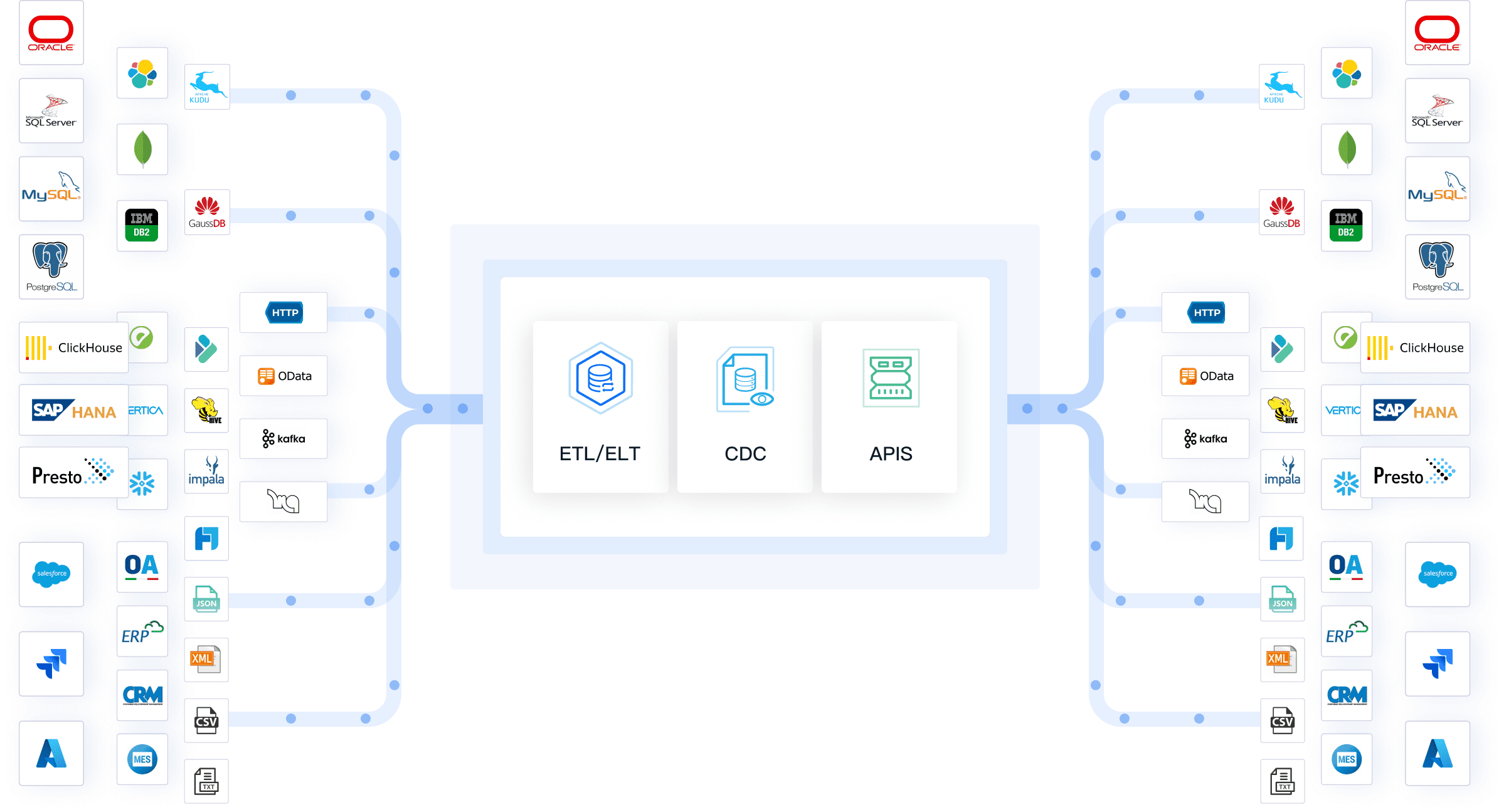
- Low-Code Platform: FineDataLink reduces the need for extensive coding, allowing users to integrate data effortlessly.
- Real-Time Synchronization: It employs data pipelines and log monitoring technology to manage large data volumes effectively.
- Diverse Data Sources: FineDataLink integrates data from multiple sources, ensuring a comprehensive view of business operations.
"FineDataLink provides significant value by simplifying complex data integration tasks and enhancing overall efficiency," experts note.
FineReport: Enhancing Reporting and Analytics
FineReport offers a flexible reporting and dashboard software solution designed for enterprise-level needs. It connects to data from any source, uncovering deeper insights and delivering the reporting and analytics businesses demand. FineReport's unique selling points include a flexible report designer, diverse visualization types, and robust deployment capabilities.
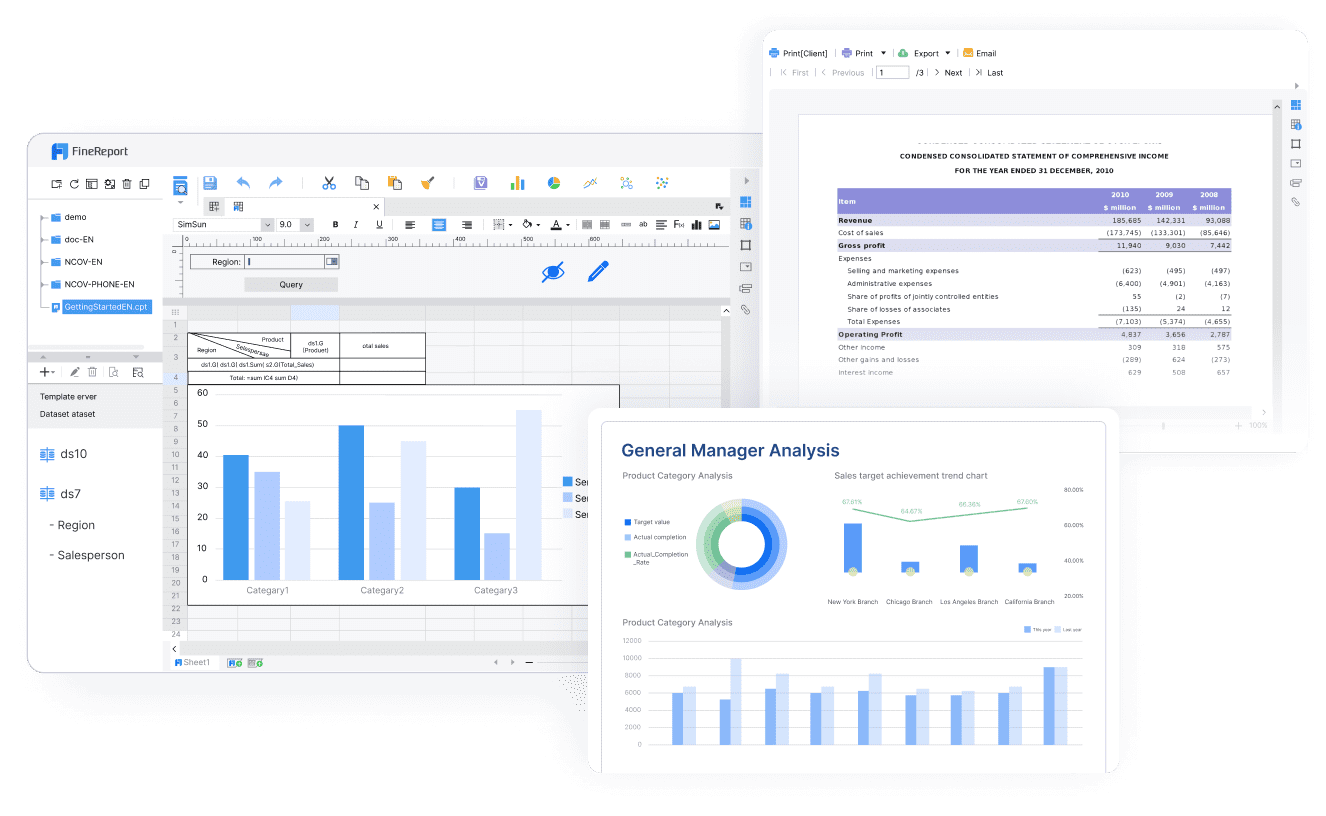
- Flexible Report Designer: FineReport allows rapid report generation through a drag-and-drop interface.
- Diverse Visualization: It supports various visualization types, making it easier to uncover insights.
- Robust Integration: FineReport seamlessly integrates with multiple data sources, enhancing reporting capabilities.
"FineReport enhances decision-making through deeper data insights and supports a wide range of business scenarios," experts explain.
FineBI: Empowering Business Intelligence
FineBI empowers business users and data analysts by providing a self-service business intelligence and analytics platform. It enables users to connect, analyze, and share data across the organization, facilitating informed decision-making.
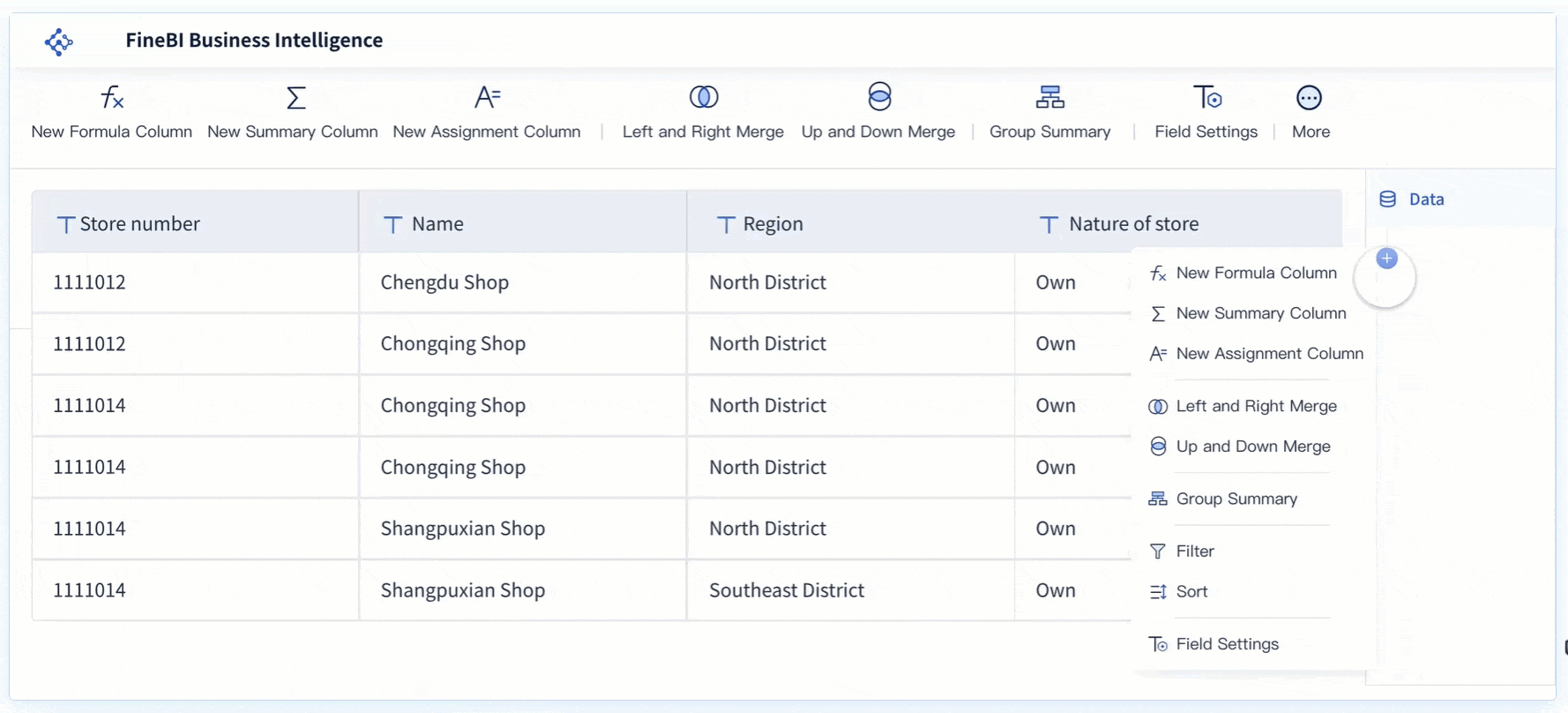
- Self-Service BI: FineBI democratizes data analysis, making it accessible to everyone within the organization.
- High-Performance Engine: It processes massive datasets and supports real-time analysis, boosting productivity.
- Augmented Analytics: FineBI offers interactive data interpretation with automatic analysis generation.
"FineBI enhances data analysis efficiency by over 50% and supports real-time analysis, which boosts productivity," experts highlight.
FanRuan's products, FineDataLink, FineReport, and FineBI, demonstrate the transformative power of data connectors in modern business operations. These tools not only streamline data integration but also enhance reporting and empower business intelligence, making them invaluable assets for organizations seeking to leverage data-driven insights.
Challenges and Considerations of the Data Connector
Data connectors offer numerous benefits, but businesses must also navigate certain challenges and considerations to maximize their effectiveness. Understanding these challenges can help organizations implement data connectors more successfully.
Data Privacy Concerns
Data privacy remains a significant concern for businesses using data connectors. As data flows between systems, ensuring that sensitive information remains secure is crucial. Unauthorized access or data breaches can lead to severe consequences, including financial loss and reputational damage. Businesses must implement robust security measures to protect data during transfer. Encryption, access controls, and regular audits can help safeguard sensitive information.
"Data connectors improve data security by enabling seamless data integration and synchronization," experts explain. However, organizations must remain vigilant to protect against potential threats.
Integration Complexity
Integrating data from multiple sources can present complexities. Different systems may use varying data formats, structures, and protocols, making seamless integration challenging. Businesses must ensure that data connectors can handle these differences effectively. Selecting the right data connector that supports diverse data formats and offers flexible integration options is essential. Additionally, organizations should invest in training and resources to manage integration complexity.
- Diverse Data Formats: Data connectors must reconcile differences between data formats to ensure compatibility.
- Flexible Integration: Choosing connectors with adaptable integration options can simplify the process.
- Training and Resources: Providing adequate training and resources helps teams manage integration challenges.
Scalability Issues
As businesses grow, their data needs evolve, requiring scalable data connector solutions. Scalability ensures that data connectors can handle increasing data volumes and new data sources without compromising performance. Organizations must assess their current and future data requirements to select connectors that offer scalability. This consideration allows businesses to adapt to changing data landscapes and maintain efficient data management.
- Increasing Data Volumes: Scalable connectors can manage large-scale data loads, preventing bottlenecks.
- New Data Sources: Businesses should choose connectors that accommodate new data sources as they arise.
- Efficient Data Management: Scalability ensures that data connectors continue to support efficient operations as businesses expand.
By addressing these challenges and considerations, businesses can leverage data connectors effectively, enhancing data integration and driving informed decision-making.
Future Trends in the Data Connector
AI and Machine Learning Integration
Data connectors increasingly integrate AI and machine learning technologies. These advancements enhance data processing capabilities, allowing businesses to analyze large datasets efficiently. AI-driven data connectors can identify patterns and trends, providing valuable insights for strategic decision-making. Machine learning algorithms improve data quality by detecting anomalies and suggesting corrections. This integration empowers organizations to leverage data more effectively, driving innovation and growth.
"Data connectors allow businesses to connect with external data sources and analyze large amounts of data in minutes," notes the DCKAP Blog. This capability significantly improves efficiency and reduces product development time.
Increased Automation
Automation continues to transform data connectors, streamlining data integration processes. Automated data connectors reduce manual intervention, minimizing errors and saving time. They enable real-time data synchronization, ensuring that businesses have access to the most current information. This increased automation enhances operational efficiency, allowing organizations to focus on strategic initiatives rather than routine data management tasks.
- Efficiency: Automated connectors streamline data transfer, reducing the need for manual data entry.
- Accuracy: By minimizing human intervention, automation decreases the likelihood of errors.
- Real-Time Access: Businesses benefit from immediate access to updated data, supporting agile decision-making.
Enhanced Interoperability
Enhanced interoperability ensures seamless communication between different platforms, facilitating efficient data exchange. Data connectors that support multiple data formats and protocols enable organizations to adapt to evolving technological landscapes. This flexibility allows businesses to integrate new data sources and destinations, maximizing the value of their data assets.
- Seamless Communication: Interoperable connectors facilitate smooth data exchange between disparate systems.
- Adaptability: Businesses can integrate new technologies without disrupting existing workflows.
- Maximized Data Value: By supporting diverse data formats, connectors enhance the utility of data across platforms.
Incorporating these future trends, data connectors will continue to evolve, offering businesses powerful tools for data integration and analysis. These advancements will drive efficiency, innovation, and strategic growth in an increasingly data-driven world.
Data connectors play a pivotal role in modern business operations. They streamline data integration, automate processes, and enhance decision-making. Businesses should leverage these tools to improve data management and gain a competitive edge. Experts at CData emphasize that data connectors eliminate manual data gathering, allowing employees to focus on strategic tasks. Companies must explore data connector solutions tailored to their specific needs. Specialists at Zuar recommend collaborating with seasoned providers for successful implementation. By embracing data connectors, businesses can unlock new opportunities and drive growth.
FAQ
A data connector serves as a tool that integrates and transfers data between different systems. It automates the data transfer process, ensuring that information flows smoothly and efficiently across various platforms.
Businesses rely on data connectors to streamline operations and improve decision-making. By integrating data from multiple sources, data connectors provide a comprehensive view of business activities. This integration enables organizations to access real-time data, leading to more informed decisions and increased productivity.
Data connectors enhance data security by providing a standardized interface for data transfer. They ensure that only authorized members of an organization can access sensitive information. This capability protects sensitive data and enhances overall data integrity.
Various types of data connectors exist, including database connectors, API connectors, cloud connectors, file-based connectors, financial connectors, IoT connectors, and big data connectors. Each type serves specific purposes and facilitates the seamless transfer of data across different systems.
Data connectors operate by connecting data sources, extracting data, transforming it for compatibility, and loading it into the destination system. This process ensures that data remains consistent, current, and accessible for analysis.
Data connectors offer numerous benefits, including streamlined data integration, real-time data access, and cost efficiency. They automate data transfer processes, reducing manual labor and minimizing errors. This automation saves time and resources, allowing businesses to focus on strategic initiatives.
Yes, data connectors can manage large-scale data loads. They support both real-time and batch data processing, ensuring that businesses have immediate access to up-to-date information. This capability proves invaluable for organizations seeking to enhance data-driven decision-making.
FanRuan offers innovative solutions like FineDataLink, FineReport, and FineBI. These products simplify data integration, enhance reporting, and empower business intelligence. FineDataLink alone has enabled the successful delivery of 1000 data projects, showcasing its effectiveness in streamlining data handling for businesses.
Continue Reading About Data Connector
15 Best Software Reporting Tools for 2025
Explore the top 15 software reporting tools for 2025. Compare features, pricing, and usability to find the best fit for your business needs.
Lewis
Oct 08, 2024
2025 Data Pipeline Examples: Learn & Master with Ease!
Unlock 2025’s Data Pipeline Examples! Discover how they automate data flow, boost quality, and deliver real-time insights for smarter business decisions.
Howard
Feb 24, 2025
2025's Best Data Validation Tools: Top 7 Picks
Explore the top 7 data validation tools of 2025, featuring key features, benefits, user experiences, and pricing to ensure accurate and reliable data.
Howard
Aug 09, 2024
Augmented Analytics: Unlock the Core Concepts & Benefits!
Discover augmented analytics—where AI and ML automate data prep and insights, revolutionizing decision-making for smarter, faster business strategies!
Lewis
Mar 04, 2025
Best Data Integration Platforms to Use in 2025
Explore the best data integration platforms for 2025, including cloud-based, on-premises, and hybrid solutions. Learn about key features, benefits, and top players.
Howard
Jun 20, 2024
Best Data Management Tools of 2025
Explore the best data management tools of 2025, including FineDataLink, Talend, and Snowflake. Learn about their features, pros, cons, and ideal use cases.
Howard
Aug 04, 2024


